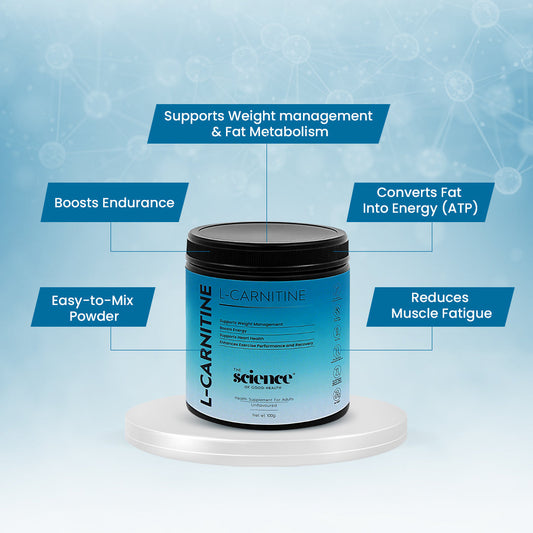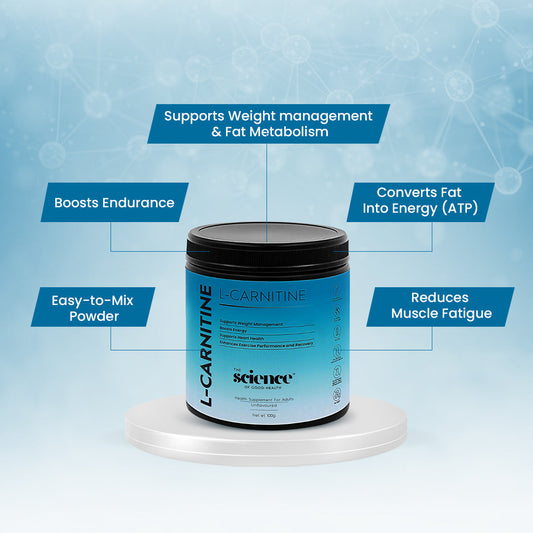If you are asking how much L-Carnitine should I take to achieve maximum results, the answer depends on your health goals, lifestyle, and the specific form of L-Carnitine you choose. L-Carnitine is a naturally occurring amino acid derivative that plays a key role in transporting fatty acids into the mitochondria, where your body converts them into energy. Getting the correct dosage is critical because too little may not provide the benefits you desire, and too much can lead to discomfort or side effects.
In this comprehensive guide, we will explain how much L-Carnitine you should take for different goals such as fat loss, brain health, athletic performance, and heart support. You will also learn about the best timing for taking it, possible side effects, and tips for combining it with nutrition and exercise for optimal results. By the end of this article, you will have a clear understanding of the ideal L-Carnitine dosage to meet your personal goals.
What Is L-Carnitine and How Does It Work?
L-Carnitine is a naturally produced compound derived from the amino acids lysine and methionine. Its main function is transporting long-chain fatty acids into mitochondria, the energy-producing centers in your cells, where these fats are burned for fuel. This process is crucial for energy production, fat metabolism, and overall cellular health.
There are different forms of L-Carnitine, each with specific benefits. Understanding these forms can help you determine how much L-Carnitine you should take depending on your goals.
-
L-Carnitine L-Tartrate is commonly used to support exercise performance and fat loss. It absorbs quickly and helps reduce exercise-induced muscle soreness.
-
Acetyl-L-Carnitine is known for its ability to cross the blood-brain barrier, supporting cognitive function, mental focus, and brain health.
-
Propionyl-L-Carnitine is often used for cardiovascular support, improving blood flow and heart health.
Your body naturally produces L-Carnitine in the liver and kidneys, but supplementation can be beneficial if you are active, trying to lose fat, or aiming to support cognitive or heart health. Knowing how much L-Carnitine you should take and choosing the right form is essential to experience its full benefits.
How Much L-Carnitine Should I Take? Recommended Dosages
Determining how much L-Carnitine should I take depends on your specific goals, age, and activity level. Here are recommended dosage ranges for different purposes:
-
For general health and daily energy support, 500 to 2000 milligrams of L-Carnitine daily is recommended. Take it in the morning or afternoon for consistent energy.
-
For fat loss, 1000 to 3000 milligrams of L-Carnitine L-Tartrate is ideal, especially when taken before workouts to enhance fat oxidation.
-
For athletic performance, 2000 to 3000 milligrams of L-Carnitine L-Tartrate taken 30 to 60 minutes before exercise can improve endurance and reduce muscle soreness.
-
For brain health, 600 to 2500 milligrams of Acetyl-L-Carnitine is suggested, preferably in the morning to support mental clarity and cognitive function.
- For heart health, 2000 to 4000 milligrams of Propionyl-L-Carnitine taken with meals can help support circulation and overall cardiovascular function.
It is important to start at the lower end of these ranges and gradually increase as needed while monitoring your body’s response. Consulting a healthcare professional before starting supplementation ensures that you are taking the right amount for your individual needs. Understanding how much L-Carnitine you should take helps you optimize results without exceeding safe limits.
When Should You Take L-Carnitine for Maximum Results?
Timing your L-Carnitine intake is just as important as dosage. The best time to take L-Carnitine depends on your goals:
-
Taking it before workouts can enhance fat burning and improve endurance, making it especially useful for those focused on fat loss or athletic performance.
-
Taking it after workouts can support muscle recovery and reduce soreness, helping you feel refreshed for your next training session.
-
For consistent energy throughout the day, taking L-Carnitine in the morning or with meals is effective, especially for cognitive benefits from Acetyl-L-Carnitine.
By understanding how much L-Carnitine you should take along with proper timing, you can maximize its effects on energy, fat metabolism, and overall performance. Consistency is key for long-term results.
What Happens If You Take Too Much L-Carnitine? Safety and Side Effects
While L-Carnitine is generally safe, exceeding recommended dosages can cause unwanted side effects. Common issues include:
-
Nausea or mild stomach discomfort
-
Diarrhea
- Fishy body odor
High-quality supplements, like The Science of Good Health L-Carnitine, are formulated to provide optimal amounts per serving (1 gram), balancing effectiveness with safety.
Exceeding the recommended dosage will not speed up results and may lead to discomfort or digestive issues. Therefore, knowing how much L-Carnitine you should take and sticking to recommended amounts ensures you enjoy its benefits safely.

Combining L-Carnitine with Exercise and Nutrition
L-Carnitine works best when combined with proper nutrition and regular exercise. Some tips for maximizing benefits include:
-
Eating protein-rich meals to support muscle repair and recovery
-
Staying well-hydrated to improve metabolism and fat utilization
-
Maintaining a consistent exercise routine to enhance fat burning and endurance
It is important to remember that L-Carnitine cannot replace exercise or a healthy diet. It is a supplement that enhances the effects of your training and nutrition plan. Understanding how much L-Carnitine you should take in combination with these habits ensures optimal results.
Choosing the Right L-Carnitine Supplement
Selecting the right supplement is crucial. Look for products that:
-
Are pure and free from unnecessary additives
-
Provide transparent dosage information
-
Are third-party tested for quality assurance
The Science of Good Health L-Carnitine is an excellent choice. It offers:
-
100 percent pure L-Carnitine powder with 1 gram per serving
-
No fillers, flavorings, or additives
-
Easy to mix and unflavored
-
Manufactured under clean-label standards
Using a high-quality supplement guarantees that you know exactly how much L-Carnitine you should take, without the risk of impurities or inconsistent dosages.
Final Thoughts
Understanding how much L-Carnitine should I take is essential for achieving consistent results in energy, fat metabolism, brain function, and cardiovascular health. Proper dosage, timing, and product quality are all critical factors.
Start with a lower dosage and gradually adjust according to your body’s response. Pair L-Carnitine supplementation with proper exercise, balanced nutrition, and adequate hydration for the best outcomes. Choosing high-quality products like The Science of Good Health L-Carnitine ensures purity, effective dosage, and safety.
By following these guidelines, you can confidently determine how much L-Carnitine you should take to meet your individual goals and enhance overall health.
Read our Latest Blogs
L Carnitine Benefits | How Much L Carnitine Per Day | L Carnitine Dosage | L Carnitine Fat Burner | L Carnitine Natural Sources | L Carnitine Pre Workout | Does L Carnitine Work | Does L Carnitine Burn Fat | L Carnitine Liquid Benefits
Frequently Asked Questions
Q1: How much L-Carnitine should I take daily for fat loss?
A: 1000 to 3000 milligrams of L-Carnitine L-Tartrate before workouts is ideal for fat loss, depending on your activity level.
Q2: Is it safe to take L-Carnitine every day?
A: Yes, daily supplementation is safe within the recommended range, typically 500 to 3000 milligrams depending on your goals.
Q3: Can I take L-Carnitine on an empty stomach?
A: Yes, it can be taken on an empty stomach, particularly pre-workout, but some people may prefer taking it with meals to reduce mild stomach discomfort.
Q4: What happens if I miss a dose?
A: Missing a single dose will not significantly affect results. Resume your normal schedule and continue with consistent intake.
Q5: How long before I see results from L-Carnitine?
A: Noticeable effects on energy, endurance, or fat metabolism usually appear within 2 to 4 weeks of consistent supplementation.
Q6: Can L-Carnitine be taken with other supplements?
A: Yes, it works well with protein powders, creatine, and pre-workout supplements to support exercise performance and recovery.
Q7: Can L-Carnitine replace exercise?
A: No, L-Carnitine is a supplement that enhances the effects of exercise. It cannot replace a balanced training routine or healthy diet.
Q8: How much L-Carnitine should I take for brain health?
A: 600 to 2500 milligrams of Acetyl-L-Carnitine daily, preferably in the morning, supports mental clarity, focus, and cognitive function.













